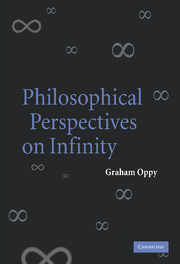Book contents
- Frontmatter
- Contents
- Preface
- Acknowledgments
- Introduction
- 1 Beginnings and Puzzles
- 2 Mathematical Preliminaries
- 3 Some Cases Discussed
- 4 Space, Time, and Spacetime
- 5 Physical Infinities
- 6 Probability and Decision Theory
- 7 Mereology
- 8 Some Philosophical Considerations
- 9 Infinite Regress and Sufficient Reason
- Conclusion
- References
- Index
1 - Beginnings and Puzzles
Published online by Cambridge University Press: 31 July 2009
- Frontmatter
- Contents
- Preface
- Acknowledgments
- Introduction
- 1 Beginnings and Puzzles
- 2 Mathematical Preliminaries
- 3 Some Cases Discussed
- 4 Space, Time, and Spacetime
- 5 Physical Infinities
- 6 Probability and Decision Theory
- 7 Mereology
- 8 Some Philosophical Considerations
- 9 Infinite Regress and Sufficient Reason
- Conclusion
- References
- Index
Summary
There are many different ways of organising discussions of the infinite. We begin by distinguishing among different kinds of problems of the infinite:
There are problems of large infinities — collections with at least denumerably many members — and there are problems of small infinities (or infinitesimals) – quantities that are nonzero and yet smaller in absolute magnitude than any finite quantity.
There are problems of denumerable infinities — collections that are, in some sense, equinumerous with the natural numbers — and there are problems of nondenumerable infinities — typically, though not always, collections that are, in some sense, equinumerous with the real numbers. Many of the problems about nondenumerable infinities are related to problems about infinitesimals and connect to questions about the understanding of continuous quantities.
There are problems about theoretical (or abstract) infinities — infinite collections of numbers, sets, propositions, properties, merely possible worlds, or the like — and there are problems about physical (or actual, or instantiated) infinities — infinite collections of physical objects, infinite values of physical quantities, and the like. Of course, there are some entities whose classification is problematic, given this distinction: For instance, should we say that spacetime points are physical objects, or should we classify them as merely theoretical entities? Indeed, more generally, there are serious questions about whether we should suppose that there are numbers, sets, propositions, properties, merely possible worlds, spacetime points, and so on.
Many of the best-known problem cases concern large, denumerable, physical infinities. The following are some examples.
- Type
- Chapter
- Information
- Philosophical Perspectives on Infinity , pp. 7 - 19Publisher: Cambridge University PressPrint publication year: 2006



